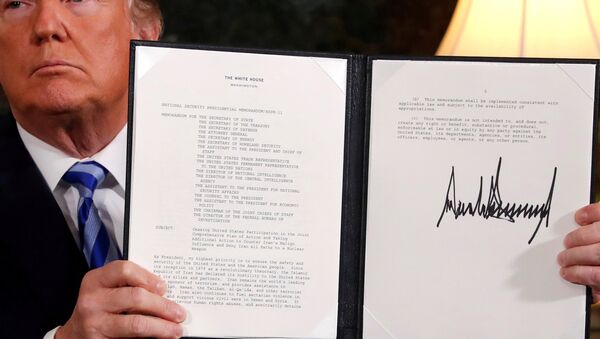Sputnik: Despite numerous pleas not to withdraw from the deal, President Trump did it anyway. Why has he taken this step? Was it to be expected?
Dr. Seyed Ali Alavi: It was expected because it was part of his manifesto during the election. Within a year President Trump pulled out of the Paris climate change agreement, and the Transatlantic Trade Agreement, and now JCPOA. It seems President Trump has started to undo all the achievements during the Democrats and during the Obama administration.
Sputnik: The Iranian leaders said that the deal will survive without the United States. What do you think that really means?
Dr. Seyed Ali Alavi: This is a kind of a litmus test for the global community to see if you a living in a multipolar system or in a unipolar system. If the signatories of the JCPOA, including Russia, China and the European Union, are confident enough to be committed to their own signatures, and if Iran also is committed, I don't see any reasons not to survive. The point is that the agreement was not only between the US and Iran. It was between the European Union, Russia, China and Iran. And it's used to be called P5+1. And now it is five minus. I think it depends on how confident they are.
READ MORE: Iran Deal: 'Trump's Decision To Pull Out Isolates US Rather Than Iran' — Prof.
Sputnik: Angela Merkel said that Europe can no longer rely on the United States to protect it. What can you say about relationship between the EU and America?
Dr. Seyed Ali Alavi: The JCPOA is only one of the elements of the relations between President Trump administration and the European Union. We could see some sort of trade war between the EU and the US, and the putting some kind of an extra tax on European products. So, in other words, this is the moment that the European Union and the other powers, superpowers, can be confident enough to pursue their own interests. So, it depends to what extent they are confident to pursue their own interests.
Sputnik: Would you agree with Angela Merkel in feeling that it's indeed true that Europe cannot rely on the US for protection?
Dr. Seyed Ali Alavi: Well, I don't think the European Union needs the United States for protection. The European Union is quite strong and has proved to be functioning. The European Union proved to be a quite functioning machine, and in that case I should say I agree with Angela Merkel.
The views and opinions expressed by the speaker do not necessarily reflect those of Sputnik.

